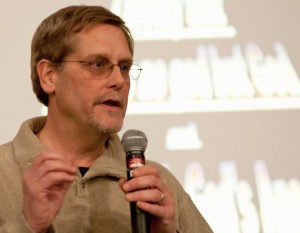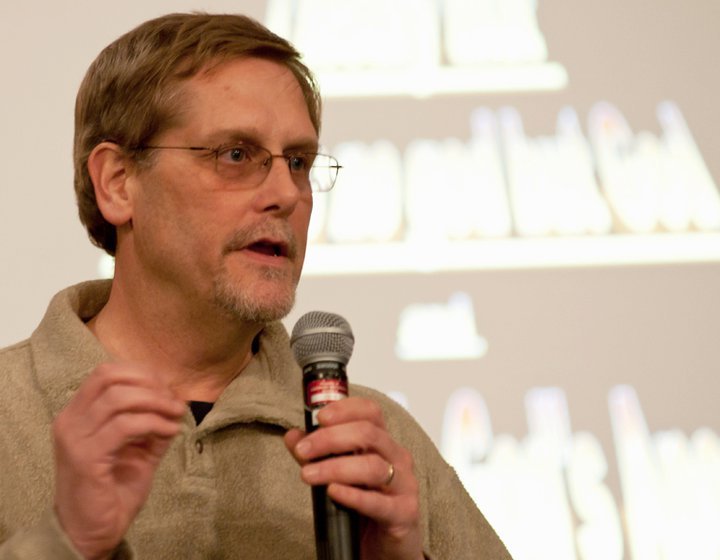Christian Zionism: Origins and Impact, Part 1 – John Hubers
 Note: This article owes a good deal to the research and writing of the Rev. Dr. Stephen Sizer, whose doctoral dissertation was published under the title: Christian Zionism: Road-map to Armageddon? (London: IVP Academic UK, 2005).
Note: This article owes a good deal to the research and writing of the Rev. Dr. Stephen Sizer, whose doctoral dissertation was published under the title: Christian Zionism: Road-map to Armageddon? (London: IVP Academic UK, 2005).
The development of the Christian Zionist movement can best be understood as a drama unfolding in three acts:
- Act 1 begins in Great Britain with the marriage of premillennial eschatology with 19th – early 20th century British imperialism.
- Act 2 moves the action to America when dispensationalist teaching becomes widely disseminated and assimilated primarily through conferences on prophesy, the ministry of Moody Bible Institute and other institutions modeled on it, and the widespread distribution of the Scofield Reference Bible which would become the study Bible of choice among a whole generation of conservative American Christians. In this act, Christian Zionism becomes less a political movement than a spiritual reference point.
- Act 3 picks up the earlier political orientation of Christian Zionism, shifting to America as its primary base of operation. It coincides with the creation of the state of Israel in 1948 and the expansion of its borders after the 1967 War, the two historical touch points for the Christian Zionist movement.
Act 1: Darby’s Dispensationalism & British Imperialism
John Nelson Darby was one of a number of British evangelicals who, in reaction to the upheavals of the French and American revolutions accompanied by the rise of Enlightenment challenges to biblical verities, developed an apocalyptic theology built on a woodenly literal interpretation of prophetic texts with little distinction between apocalyptic and non-apocalyptic literature. The fact that Darby was trained as an engineer was seen in the systematically structural way he built his eschatology. At its core was what Don Wagner identifies as an “adaptation of earlier forms of historic premillennial theology with various novel doctrines, including the assertion that:
- the prophetic texts and most of the Bible must be interpreted within a literalist and predictive hermeneutic;
- while there are two separate covenants between God and the “chosen people” (Israel and the Church), the covenant with Israel (and all of its components such as land, nation, etc.) should be interpreted as being eternal and exclusively for Jews;
- “the true Church” (those born again in Jesus Christ) will be raptured (“translated”) out of history when Jesus will return to meet it in the clouds (I Thessalonians 5:1-11). At that point the nation of Israel will become the primary covenantal body in history, but only Jews who accept Christ as Savior will be spared the final battle;
- There will be seven “dispensations” or historical epochs that mark the entirety of history from Creation to Christ’s millennial reign on earth.”[1]
Darby himself was apolitical, but his influence extended to well connected British political figures, the most important of whom was Lord Anthony Ashley Cooper, seventh Earl of Shaftesbury. Lord Shaftesbury was an influential figure among evangelicals of his day. He also had the ear of powerful British politicians including the British foreign minister, Lord Palmerton. Shaftesbury became a tireless advocate for the dispensationalist take on Biblical teaching both in his work with the church and on the political scene. He was, says Donald Wagner, the most influential figure of his age in terms of what he did to advance the Christian Zionist cause:
Through his writings, public speaking, and lobbying efforts, Lord Shaftesbury did more than anyone before him to translate Christian Zionist themes into a political initiative. In addition to influencing British colonial perceptions of the Near East, Shaftesbury also predisposed the next generation of British conservative politicians favorably toward the World Zionist movement, which led eventually to British support of the Jewish state.[2]
Among those who were influenced by the political ramifications of Christian Zionism was a man who would become instrumental in giving British support to the Zionist program of establishing a Jewish state in Palestine, Lord Arthur James Balfour whose “declaration” gave British imperial support to the establishment of a Jewish state in what became a British mandate following W.W. I.
His Majesty’s government views with favor the establishment in Palestine of a national home for the Jewish people, and will use their best endeavors to facilitate the achievement of this object, it being clearly understood that nothing shall be done which may prejudice the civil and religious rights of the existing non Jewish communities in Palestine, or the rights and political status enjoyed by Jews in any other country.[3].
This, of course, had less to do with eschatology than British imperial policy, the idea being that British support for what could be envisioned as a European Jewish client state would give Britain a toe hold in a part of the world over which she sought greater influence. But Balfour’s evangelical upbringing which was colored in part by the influence of an eschatological vision of Jewish restoration contributed to it.
Act 2: Christian Zionism Comes to America
Darby and his disciples made a number of “missionary journeys” to America in the mid to late 19th century where they were frequent guests at prophesy conferences and evangelical meetings. A key convert to Darby’s dispensationalism during this time was the influential Presbyterian preacher and writer James Brooks, the man whom John Gestner identifies as “the Father of American Dispensationalism.”[4] Brookes met Darby during five visits Darby made to St. Louis in 1864-65. There Brookes also introduced Darby to a young Bible student named C.I. Scofield, who would in turn go on to author the notes for the popular dispensationalist Bible which bears his name.
One of Darby’s disciples, the British evangelist Henry Moorehouse, introduced Darby’s teaching to Dwight Moody, who became a devotee as well. Through his Bible Institute and others modeled on it, dispensationalism became a normative interpretive approach to Bible study in many evangelical circles:
Although not the first of such schools, Moody’s Institute in Chicago became the prototype. Since Moody had imbibed a fair dose of dispensationalism in a rather typical unstructured form, and his colleague and successor R.A. Torrey in a more systematic way, naturally the burgeoning Bible school movement, with a few exceptions, should follow this line of thought. Because many of the theological schools opted for divergent views, the Bible Schools unintentionally became training centers for evangelical ministers and Darby’s prophetic teaching became more widely accepted than ever.[5]
The difference between dispensationalism in America and Britain during this period was the absence of an overtly political agenda. This was due to a number of factors, not least of which was the largely apolitical nature of American fundamentalism. But that would change particularly after the ’67 war when American dispensationalists discovered their political voice.
TO BE CONTINUED . . . .
The Rev. Dr. John M. Hubers is assistant professor of missiology at Northwestern College in Orange City, Iowa. From 2001-2006 he held the Middle East and South Asia desk for the Reformed Church in America. He earned his BA in History from the institution where he is currently teaching, his MDiv from New Brunswick Theological Seminary (NJ) and his ThM and PhD from the Lutheran School of Theology at Chicago. During his seminary training, Rev. Hubers spent one year in Cairo, Egypt studying Arabic and Christian/Muslim relations. From 1986-96 Dr. Hubers served as pastor of international congregations in the Arabian Gulf States of Oman and Bahrain, where he had also taught English for two years after graduating from university. He has also served churches in New York, Michigan and Texas. Dr. Hubers is the author of a number of articles relating to Christian-Muslim relations in the Church Herald, the former denominational magazine of the Reformed Church in America, along with several articles in The Other Side magazine on topics relating to Islam, the first Gulf War, and Christian/Muslim relations in Egypt. “Zion’s Christian Soldiers” is Rev. Hubers’ critique of Christian Zionism (a study guide for Reformed Church congregations), and “Christian Zionism and the Myth of America” is the text of an address he gave to the Middle East Council of Churches conference in Beirut, Lebanon (2002). Both papers are available at HCEF’s website. Dr. Hubers and his wife Lynne have two grown children.
[1] Wagner, 2004. 171.
[2] Don Wagner, 1995. Anxious for Armegeddon, Scottdale: Herald Press, 92
[3] Wagner, 1995. 94.
[4] John Gestner, 1991. Wrongly Dividing the Word of Truth, Brentwood, Tennessee: Wolgemuth and Hyatt, 38.
[5] Ian S. Rennie, 1977. Nineteenth Century Roots in Handbook of Biblical Prophesy, ed. Carl E. Armerding and W. Ward Gasque, Grand Rapids: Baker, 57.


When I read this history, i really wish i had a time machine to go back and derail this movement! But then I am stumped by which dispensationalist i would want to visit and set straight! Which one would you want to visit and enlighten? BTW, I learned from the new John Judis book that Lord Balfour was a Presbyterian. I did not know that!!! Also learned that the Zionists were disappointed with the Balfour Declaration bcz they wanted it to say “Jewish State” but got “Jewish Homeland” instead, and that wasn’t good enough! Wow!
Good question! It is, however, one of those questions that may have no proper answer as we have to deal with the cards we are dealt. I think the response some would make is that given the holocaust and the long running persecution of Jews in Europe that this may have happened anyway as the Zionist movement had its own impetus.
As for the Presbyterian connection this is not surprising as the Christians who were most supportive of a restored Israel before the rise of dispensationalism were the Puritans and the early American Calvinists. The difference was that they were post-millennialists believing that the Gospel would take root through missionary efforts around the world, Christian civilization would blossom, then the Jews would convert and return to Palestine to usher in the Second Coming. Eschatology was not invented by Darby, but the emphasis on the literal fulfillment – God having a parallel purpose for Jews (and only a secondary purpose for Christians) was.
I think the critical person in this scenario if you wished to fulfill this fantasy would be Shaftesbury. He had the most impact in terms of turning British public interest towards restoration. Balfour followed in his wake.